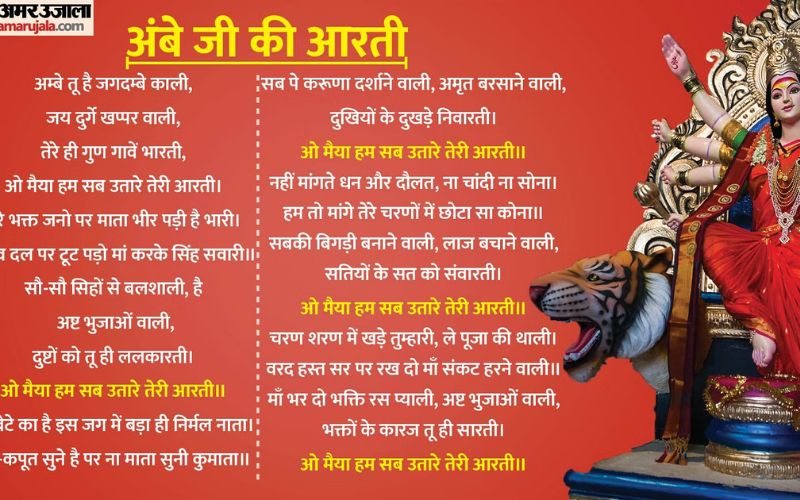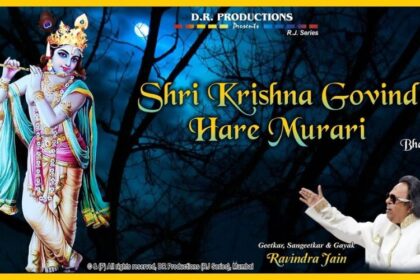Anuradha Paudwal is a renowned Indian playback singer who has lent her soulful voice to numerous devotional and spiritual songs. Her versatility and dedication to the art of devotional music have earned her a special place in the hearts of millions of devotees across the country. One of her most popular and revered compositions is the mesmerizing “Ambe Tu Hai Jagdambe Kali,” which has become a staple in the repertoire of Hindu devotional music.
As you delve into the captivating world of “Ambe Tu Hai Jagdambe Kali,” you’ll discover the profound significance of the lyrics and the profound impact they have had on the spiritual journey of countless individuals. Join us as we explore the depths of this devotional masterpiece, unraveling the layers of meaning and the enduring appeal that have made it a timeless classic.
The significance of “Ambe Tu Hai Jagdambe Kali” lyrics
The lyrics of “Ambe Tu Hai Jagdambe Kali” hold immense spiritual significance for devotees of the divine Mother Goddess, Durga. The invocation of the names “Ambe” and “Jagdambe Kali” are deeply rooted in Hindu mythology and represent the ultimate embodiment of the divine feminine principle.
“Ambe” is a revered name for the Mother Goddess, signifying her nurturing and compassionate nature. “Jagdambe” means the “Mother of the Universe,” highlighting the Goddess’s all-encompassing power and her role as the sustainer of the cosmos. “Kali,” on the other hand, represents the fierce and destructive aspect of the Goddess, responsible for the annihilation of evil and the restoration of cosmic balance.
The lyrics of “Ambe Tu Hai Jagdambe Kali” invoke the Goddess in her multifaceted form, acknowledging her as the supreme divine power that transcends all duality and encompasses the entirety of creation. This powerful invocation is believed to invoke the Goddess’s blessings, protection, and guidance, making it a cherished devotional practice for millions of devotees.
Anuradha Paudwal’s rendition of “Ambe Tu Hai Jagdambe Kali”
Anuradha Paudwal’s rendition of “Ambe Tu Hai Jagdambe Kali” is a true testament to her mastery of devotional music. Her soulful and emotive delivery of the lyrics, combined with her impeccable command of classical musical traditions, has elevated the song to a level of profound spiritual resonance.
Anuradha’s voice, with its depth and richness, effortlessly captures the essence of the Goddess’s multifaceted nature. Her seamless transitions between the gentle invocations and the powerful, rhythmic chants create a mesmerizing tapestry of sound that transports the listener into a realm of pure devotion.
The sheer intensity and devotion that Anuradha Paudwal pours into her rendition of “Ambe Tu Hai Jagdambe Kali” have made it a cherished and revered piece of devotional music. Her unwavering commitment to the spiritual significance of the lyrics and her ability to convey the Goddess’s divine presence through her voice have earned her the admiration and reverence of devotees across the country.
Understanding the lyrics of “Ambe Tu Hai Jagdambe Kali”
The lyrics of “Ambe Tu Hai Jagdambe Kali” are a profound and intricate tapestry of devotional expression. Each line and verse holds a deeper meaning, inviting the listener to delve into the layers of spiritual significance.
The opening line, “Ambe Tu Hai Jagdambe Kali,” establishes the central theme of the song, invoking the Goddess in her multifaceted form as the nurturing “Ambe,” the all-encompassing “Jagdambe,” and the fierce “Kali.” This invocation sets the stage for the devotee’s supplication and surrender to the divine Mother.
The subsequent verses explore the various attributes and powers of the Goddess, acknowledging her as the:
- Protector and Sustainer: “Tujhe Bhakton Ki Raksha Karni Hai” (You must protect your devotees)
- Destroyer of Evil: “Daitya Sanghara Kari” (You who destroys the demons)
- Bestower of Blessings: “Bhakton Ko Vardaan Deti Hai” (You who grant blessings to your devotees)
- Embodiment of Wisdom: “Gyaan Daan Kari” (You who bestows the gift of knowledge)
These verses highlight the Goddess’s role as the ultimate source of protection, strength, and enlightenment, making her the supreme object of devotion and reverence.
The lyrics also invoke the Goddess’s divine attributes, such as her “Maha Shakti” (great power), “Maha Maya” (great illusion), and “Maha Kali” (the great Kali), further emphasizing her transcendental and all-encompassing nature.
Translating the lyrics of “Ambe Tu Hai Jagdambe Kali” in English
To fully appreciate the depth and significance of the “Ambe Tu Hai Jagdambe Kali” lyrics, let’s explore their English translation:
Ambe, You are the Jagdambe Kali You must protect your devotees You who destroys the demons You who grant blessings to your devotees You who bestows the gift of knowledge
Oh, great power, great illusion, great Kali You are the supreme Mother Goddess The sustainer of the universe The destroyer of evil The bestower of wisdom and enlightenment
This translation captures the essence of the lyrics, highlighting the Goddess’s multifaceted nature and the devotee’s reverence and supplication to her divine presence. The English rendition helps to bridge the gap between the original Sanskrit/Hindi lyrics and the understanding of a wider audience, making the spiritual significance more accessible.
The popularity of “Ambe Tu Hai Jagdambe Kali” among devotees
The enduring popularity of “Ambe Tu Hai Jagdambe Kali” among devotees can be attributed to its profound spiritual significance and the deep connection it fosters with the divine Mother Goddess. The song has become a staple in Hindu devotional practices, particularly during the celebration of Navaratri, the nine-day festival honoring the Goddess in her various manifestations.
During Navaratri, the chanting of “Ambe Tu Hai Jagdambe Kali” is a common sight in temples, homes, and community gatherings. The devotees seek the Goddess’s blessings, protection, and guidance through the recitation of these powerful lyrics, which resonate deeply with their spiritual aspirations.
Moreover, the song’s popularity transcends geographical and cultural boundaries, with devotees across India and the world finding solace and inspiration in its timeless message. The soulful renditions of Anuradha Paudwal and other renowned devotional artists have further amplified the song’s reach, making it a beloved and cherished part of the Hindu devotional music canon.
Anuradha Paudwal’s contribution to devotional music
Anuradha Paudwal’s legacy as a devotional singer is unparalleled, and her rendition of “Ambe Tu Hai Jagdambe Kali” is just one of the many gems she has contributed to the rich tapestry of Hindu devotional music.
Throughout her illustrious career, Anuradha Paudwal has lent her voice to countless devotional and spiritual songs, each one imbued with her unique blend of technical mastery and heartfelt devotion. From the soothing “Jai Ambe Gauri” to the powerful “Aarti Kunj Bihari Ki,” her repertoire is a testament to her unwavering commitment to the divine and her ability to connect with the spiritual yearnings of her audience.
Anuradha’s dedication to the art of devotional music has not only enriched the lives of countless devotees but has also helped to preserve and promote the rich cultural heritage of India. Her contributions have earned her numerous accolades, including the prestigious Padma Shri award, recognizing her outstanding achievements and her role as a cultural ambassador.
Other popular devotional songs by Anuradha Paudwal
In addition to the beloved “Ambe Tu Hai Jagdambe Kali,” Anuradha Paudwal has graced the world of devotional music with numerous other captivating compositions. Some of her most popular devotional songs include:
- “Jai Ambe Gauri”: A soothing and melodious invocation of the Goddess Durga, known for its calming and uplifting effect on the listener.
- “Aarti Kunj Bihari Ki”: A powerful and rhythmic aarti (devotional hymn) dedicated to Lord Krishna, showcasing Anuradha’s versatility in adapting to different devotional traditions.
- “Mere Ganesha”: A joyful and celebratory song honoring the beloved elephant-headed deity, Lord Ganesha, often performed during the Ganesh Chaturthi festival.
- “Jai Jai Shiv Shankar”: A devotional hymn that pays homage to Lord Shiva, the great destroyer and transformer, with Anuradha’s soulful rendition evoking a sense of reverence and awe.
- “Sai Baba Teri Aarti”: A heartfelt ode to the revered saint, Sai Baba, showcasing Anuradha’s ability to capture the essence of diverse spiritual traditions.
Each of these devotional songs, along with “Ambe Tu Hai Jagdambe Kali,” has become an integral part of the Hindu devotional music landscape, enriching the spiritual lives of millions of devotees across the world.
Conclusion
The enduring appeal of “Ambe Tu Hai Jagdambe Kali” lies in its profound spiritual significance and its ability to transcend the boundaries of time and space. The lyrics, with their invocation of the divine Mother Goddess in her multifaceted form, have struck a deep chord with devotees, who find solace, strength, and guidance in the Goddess’s boundless power and compassion.
Anuradha Paudwal’s soulful rendition of the song has further amplified its resonance, capturing the essence of the Goddess’s presence and the devotee’s reverence. Her unwavering commitment to the spiritual message of the lyrics and her technical mastery have elevated “Ambe Tu Hai Jagdambe Kali” to a revered status in the pantheon of Hindu devotional music.
As generations of devotees continue to chant and cherish these timeless lyrics, the enduring appeal of “Ambe Tu Hai Jagdambe Kali” stands as a testament to the enduring power of devotion and the transformative impact of the divine feminine principle. This song, and the countless other devotional gems in Anuradha Paudwal’s repertoire, serve as a bridge between the earthly and the celestial, connecting the devotee’s heart with the boundless grace of the Goddess.
If you’re captivated by the profound spiritual significance and the soulful rendition of “Ambe Tu Hai Jagdambe Kali,” we invite you to explore more of Anuradha Paudwal’s devotional music. Discover the depth and beauty of her other renowned compositions and let them guide you on your own spiritual journey. Click here to access Anuradha Paudwal’s complete discography and immerse yourself in the timeless melodies of devotional music.





